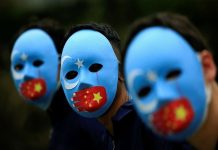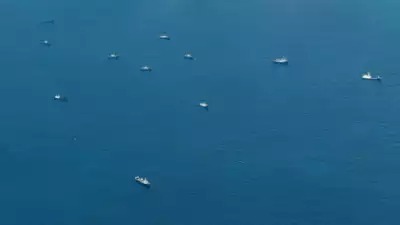The US is not working to create a “NATO for the Pacific” as a way to target China, the White House has claimed, after President Joe Biden declared a “new era” of security cooperation with South Korea and Japan.
Biden hosted Japanese Prime Minister Fumio Kishida and South Korean President Yoon Suk-yeol at Camp David on Friday for the first summit of its kind, where the heads of state agreed on several new initiatives in the military, economic, and technological spheres.
“This is the first summit I’ve hosted at Camp David, and I can think of no more fitting location to symbolize our new era of cooperation,” Biden said at a joint press conference, adding that Washington’s commitment to Seoul and Tokyo remains “ironclad.”
The US president went on to state that the three allies would enhance their “trilateral defense collaboration” in the Indo-Pacific region, including with “annual multi-domain military exercises.” The drills would build on periodic wargames already staged in the area, which have triggered the ire of both Chinese and North Korean officials.
During a separate media briefing earlier on Friday, National Security Advisor Jake Sullivan was asked whether the three-way partnership would be “the beginning of some kind of mini-NATO for the Pacific,” but replied in the negative.
“It’s explicitly not a NATO for the Pacific. We’ve said that. We will continue to underscore that and so will both Japan and Korea,” Sullivan said, adding that Friday’s summit was “not against anyone.”
Though Biden also claimed the meeting was “not about China,” the president and his allied counterparts referred to the People’s Republic repeatedly in comments to reporters. During a one-on-one meeting with Kishida earlier in the day, Biden said the two leaders would work together to combat Beijing’s “dangerous behavior in the South China Sea,” and stressed the need for “peace and stability in the Taiwan Strait.”
Asked whether Tokyo’s stepped-up military ties with Washington might trigger an “economic cold war” with Beijing, Kishida said Japan would continue to cooperate with China on “common challenges” and “strongly request responsible conduct.”
President Yoon also outlined what this new defense cooperation would entail, stating that the three allies would create a framework to respond to attacks on any of their countries, as well as sharing information about North Korean ballistic missile launches in “real time.” He also announced plans for “systematic training and drills” to be carried out on a regular basis.

































